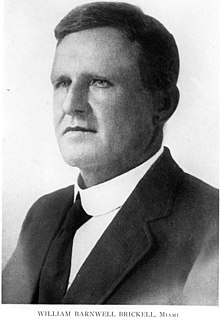| This article needs additional citations for verification. Please help improve this article by adding citations to reliable sources. Unsourced material may be challenged and removed. Find sources: "William Brickell" – news · newspapers · books · scholar · JSTOR (June 2020) (Learn how and when to remove this message) |

William Brickell (May 22, 1817(?) – January 14, 1908) joined Julia Tuttle as a co-founder of Miami, Florida.
During the Civil War, Brickell and his wife Mary, whom he met and married in Australia, lived in the White House while he worked as an aide to President Abraham Lincoln.
In 1868, the Brickells purchased two tracts of land, one of which stretched from Coconut Grove to the Miami River, which they purchased from Mrs. Harriet English and her brother Richard Fitzpatrick who had acquired it by grant from the King of Spain. The family moved to southern Florida from Cleveland, Ohio, arriving by ship in 1871. He and his family opened a trading post and post office in their home on the south bank of the Miami River, near the site of Fort Dallas.
The Brickells' neighbor, Julia Tuttle, also originally from Cleveland, is credited with attracting the attention of Florida's east coast railroad and resort hotel magnate Henry M. Flagler to extend his interests to the area. Both Brickell and Tuttle contributed land to the Flagler's Florida East Coast Railway, which brought growth and development and put Miami on the map. After William Brickell's death, his widow, Mary Brickell, became one of the young city's prominent real estate developers and managers.

Originally, William and Mary Brickell were entombed on their property located at 501 Brickell Avenue, Miami, but in 1946 their daughter Maud Brickell decided to move her parents to Woodlawn Park Cemetery and Mausoleum, now Caballero Rivero Woodlawn North Park Cemetery and Mausoleum.
See also
References
- ^ Knight, Richard (1960-11-23). "Obituary of Maude Brickell". The Miami Herald. p. 22.
- ^ "Name of Brickells Linked With History: Pioneers Came to Miami and Bought Two Tracts of Land in 1868". The Miami Herald. 1929-07-28. p. 122.
- Beth Brickell. William and Mary Brickell: Founders of Miami and Fort Lauderdale. The History Press, 2011 ISBN 978-1609492137
This article about an American businessperson born in the 1810s is a stub. You can help Misplaced Pages by expanding it. |